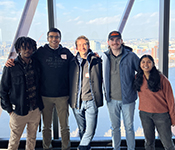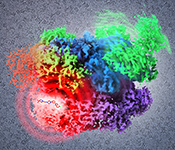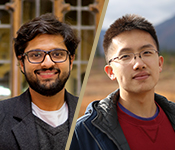Skip to main content
 Jan Buzek (left) and Nuria Alina Chandra were named 2023 Goldwater Scholars.
Allen School undergraduates Jan Buzek and Nuria Alina Chandra are among five University of Washington students to be named 2023 Goldwater Scholars by the Barry M. Goldwater Scholarship and Excellence in Education Foundation. The Goldwater Scholars program recognizes and supports outstanding students who intend to pursue careers in mathematics, engineering and the natural sciences.
Buzek is a junior studying computer science and mathematics who counts Allen School… Read more →
Jan Buzek (left) and Nuria Alina Chandra were named 2023 Goldwater Scholars.
Allen School undergraduates Jan Buzek and Nuria Alina Chandra are among five University of Washington students to be named 2023 Goldwater Scholars by the Barry M. Goldwater Scholarship and Excellence in Education Foundation. The Goldwater Scholars program recognizes and supports outstanding students who intend to pursue careers in mathematics, engineering and the natural sciences.
Buzek is a junior studying computer science and mathematics who counts Allen School… Read more →
April 12, 2023
 The team competed at the Tech For Change Civic Tech Hackathon hosted by Boston University, winning the election turnout track. Photo by Impact++
In February, University of Washington student group Impact++ won one of the tracks at the Tech For Change Civic Tech (TFC) Hackathon held at Boston University. The hackathon tasked student teams with building creative solutions in the interest of changing public policy. This year’s competition included three tracks: education, election turnout and government policy rooted in social… Read more →
The team competed at the Tech For Change Civic Tech Hackathon hosted by Boston University, winning the election turnout track. Photo by Impact++
In February, University of Washington student group Impact++ won one of the tracks at the Tech For Change Civic Tech (TFC) Hackathon held at Boston University. The hackathon tasked student teams with building creative solutions in the interest of changing public policy. This year’s competition included three tracks: education, election turnout and government policy rooted in social… Read more →
April 5, 2023
 Biomedical research has yielded troves of data on protein function, cell types, gene expression and drug formulas that hold tremendous promise for assisting scientists in responding to novel diseases as well as fighting old foes such as Alzheimer’s, cancer and Parkinson’s. Historically, their ability to explore these massive datasets has been hampered by an outmoded model that relied on painstakingly annotated data, unique to each dataset, that precludes more open-ended exploration. But that may be about to change. Read more →
Biomedical research has yielded troves of data on protein function, cell types, gene expression and drug formulas that hold tremendous promise for assisting scientists in responding to novel diseases as well as fighting old foes such as Alzheimer’s, cancer and Parkinson’s. Historically, their ability to explore these massive datasets has been hampered by an outmoded model that relied on painstakingly annotated data, unique to each dataset, that precludes more open-ended exploration. But that may be about to change. Read more →
April 3, 2023
 To say Anat Caspi’s mission is pedestrian in nature would be accurate to some degree. And yet, when looked at more closely, one realizes it’s anything but. In 2015, the Allen School scientist was thinking about how to build a trip planner that everyone could use, similar to Google Maps but different in striking ways. Current tools didn’t account for various types of pedestrians and the terrain they confronted on a daily basis. What if there were barriers blocking the sidewalk? A steep incline listing to and fro? Stairs but no ramp? Read more →
To say Anat Caspi’s mission is pedestrian in nature would be accurate to some degree. And yet, when looked at more closely, one realizes it’s anything but. In 2015, the Allen School scientist was thinking about how to build a trip planner that everyone could use, similar to Google Maps but different in striking ways. Current tools didn’t account for various types of pedestrians and the terrain they confronted on a daily basis. What if there were barriers blocking the sidewalk? A steep incline listing to and fro? Stairs but no ramp? Read more →
March 30, 2023
 According to the U.S. Centers for Disease Control, one out of every three adults in the United States have prediabetes, a condition marked by elevated blood sugar levels that could lead to the development of type 2 diabetes. The good news is that, if detected early, prediabetes can be reversed through lifestyle changes such as improved diet and exercise. The bad news? Eight out of 10 Americans with prediabetes don’t know that they have it... Read more →
According to the U.S. Centers for Disease Control, one out of every three adults in the United States have prediabetes, a condition marked by elevated blood sugar levels that could lead to the development of type 2 diabetes. The good news is that, if detected early, prediabetes can be reversed through lifestyle changes such as improved diet and exercise. The bad news? Eight out of 10 Americans with prediabetes don’t know that they have it... Read more →
March 30, 2023
 Photo credit: Ryan Hoover
A little more than two decades ago, University of Washington professor Georg Seelig began planting the seeds of a career in theoretical physics, seeking elegant solutions to the mysteries of the natural world. Last month, Seelig, a faculty member in the Allen School and Department of Electrical & Computer Engineering, was hailed as the “DNA Computer Scientist of the Year” by the International Society for Nanoscale Science, Computation and Engineering (ISNSCE), who named him the winner … Read more →
Photo credit: Ryan Hoover
A little more than two decades ago, University of Washington professor Georg Seelig began planting the seeds of a career in theoretical physics, seeking elegant solutions to the mysteries of the natural world. Last month, Seelig, a faculty member in the Allen School and Department of Electrical & Computer Engineering, was hailed as the “DNA Computer Scientist of the Year” by the International Society for Nanoscale Science, Computation and Engineering (ISNSCE), who named him the winner … Read more →
March 21, 2023
 Arvind Krishnamurthy (left) and Michael Taylor will lend their expertise to the ACE Center for Evolvable Computing, a multi-university venture focused on the development of microelectronics and semiconductor computing technologies.
Data centers account for about 2% of total electricity use in the U.S., according to the U.S. Office of Energy Efficiency and Renewable Energy, consuming 10 to 50 times the energy per floor space of a typical commercial office building. Meanwhile, advances in distributed computing have spurred innovation with the… Read more →
Arvind Krishnamurthy (left) and Michael Taylor will lend their expertise to the ACE Center for Evolvable Computing, a multi-university venture focused on the development of microelectronics and semiconductor computing technologies.
Data centers account for about 2% of total electricity use in the U.S., according to the U.S. Office of Energy Efficiency and Renewable Energy, consuming 10 to 50 times the energy per floor space of a typical commercial office building. Meanwhile, advances in distributed computing have spurred innovation with the… Read more →
February 21, 2023
 The Alfred P. Sloan Foundation has named the Allen School’s Leilani Battle (B.S., ‘11) a 2023 Sloan Research Fellow, a distinction that recognizes early-career researchers whose achievements place them among the next generation of scientific leaders in the U.S. and Canada. The two-year, $75,000 fellowships support research across the sciences and have been awarded to some of the world’s most preeminent minds in their respective fields.
“My research is not traditional computer science research so it’s wonderful to be… Read more →
The Alfred P. Sloan Foundation has named the Allen School’s Leilani Battle (B.S., ‘11) a 2023 Sloan Research Fellow, a distinction that recognizes early-career researchers whose achievements place them among the next generation of scientific leaders in the U.S. and Canada. The two-year, $75,000 fellowships support research across the sciences and have been awarded to some of the world’s most preeminent minds in their respective fields.
“My research is not traditional computer science research so it’s wonderful to be… Read more →
February 15, 2023
 Whether traversing new frontiers or old, Jessica Colleran keeps moving forward.
The third-year computer science major, along with University of Washington teammates Curtis Anderson and Annika Mihata, recently won the Orienteering USA (OUSA) Junior National Intercollegiate Championships, which were held in Georgia earlier this year. Their victory marks the first time in more than two decades that a team other than West Point has taken home the trophy.
“When I came to UW, I found a group of people… Read more →
Whether traversing new frontiers or old, Jessica Colleran keeps moving forward.
The third-year computer science major, along with University of Washington teammates Curtis Anderson and Annika Mihata, recently won the Orienteering USA (OUSA) Junior National Intercollegiate Championships, which were held in Georgia earlier this year. Their victory marks the first time in more than two decades that a team other than West Point has taken home the trophy.
“When I came to UW, I found a group of people… Read more →
February 6, 2023
 Dhruv Jain
The Allen School has recognized Dhruv Jain (Ph.D., ‘22) and Kuikui Liu (Ph.D., ‘22) with the William Chan Memorial Dissertation Award, which honors graduate dissertations of exceptional merit and is named in memory of the late graduate student William Chan. Jain was chosen for his work in advancing new sound awareness systems for accessibility, while Liu was selected for his work on a new framework for analyzing the Markov Chain Monte Carlo method.
Jain’s dissertation, titled “Sound … Read more →
Dhruv Jain
The Allen School has recognized Dhruv Jain (Ph.D., ‘22) and Kuikui Liu (Ph.D., ‘22) with the William Chan Memorial Dissertation Award, which honors graduate dissertations of exceptional merit and is named in memory of the late graduate student William Chan. Jain was chosen for his work in advancing new sound awareness systems for accessibility, while Liu was selected for his work on a new framework for analyzing the Markov Chain Monte Carlo method.
Jain’s dissertation, titled “Sound … Read more →
January 30, 2023
« Newer Posts — Older Posts »




 Biomedical research has yielded troves of data on protein function, cell types, gene expression and drug formulas that hold tremendous promise for assisting scientists in responding to novel diseases as well as fighting old foes such as Alzheimer’s, cancer and Parkinson’s. Historically, their ability to explore these massive datasets has been hampered by an outmoded model that relied on painstakingly annotated data, unique to each dataset, that precludes more open-ended exploration. But that may be about to change. Read more →
Biomedical research has yielded troves of data on protein function, cell types, gene expression and drug formulas that hold tremendous promise for assisting scientists in responding to novel diseases as well as fighting old foes such as Alzheimer’s, cancer and Parkinson’s. Historically, their ability to explore these massive datasets has been hampered by an outmoded model that relied on painstakingly annotated data, unique to each dataset, that precludes more open-ended exploration. But that may be about to change. Read more →
 To say Anat Caspi’s mission is pedestrian in nature would be accurate to some degree. And yet, when looked at more closely, one realizes it’s anything but. In 2015, the Allen School scientist was thinking about how to build a trip planner that everyone could use, similar to Google Maps but different in striking ways. Current tools didn’t account for various types of pedestrians and the terrain they confronted on a daily basis. What if there were barriers blocking the sidewalk? A steep incline listing to and fro? Stairs but no ramp? Read more →
To say Anat Caspi’s mission is pedestrian in nature would be accurate to some degree. And yet, when looked at more closely, one realizes it’s anything but. In 2015, the Allen School scientist was thinking about how to build a trip planner that everyone could use, similar to Google Maps but different in striking ways. Current tools didn’t account for various types of pedestrians and the terrain they confronted on a daily basis. What if there were barriers blocking the sidewalk? A steep incline listing to and fro? Stairs but no ramp? Read more →
 According to the U.S. Centers for Disease Control, one out of every three adults in the United States have prediabetes, a condition marked by elevated blood sugar levels that could lead to the development of type 2 diabetes. The good news is that, if detected early, prediabetes can be reversed through lifestyle changes such as improved diet and exercise. The bad news? Eight out of 10 Americans with prediabetes don’t know that they have it... Read more →
According to the U.S. Centers for Disease Control, one out of every three adults in the United States have prediabetes, a condition marked by elevated blood sugar levels that could lead to the development of type 2 diabetes. The good news is that, if detected early, prediabetes can be reversed through lifestyle changes such as improved diet and exercise. The bad news? Eight out of 10 Americans with prediabetes don’t know that they have it... Read more →


 The Alfred P. Sloan Foundation has named the Allen School’s Leilani Battle (B.S., ‘11) a 2023 Sloan Research Fellow, a distinction that recognizes early-career researchers whose achievements place them among the next generation of scientific leaders in the U.S. and Canada. The two-year, $75,000 fellowships support research across the sciences and have been awarded to some of the world’s most preeminent minds in their respective fields.
“My research is not traditional computer science research so it’s wonderful to be… Read more →
The Alfred P. Sloan Foundation has named the Allen School’s Leilani Battle (B.S., ‘11) a 2023 Sloan Research Fellow, a distinction that recognizes early-career researchers whose achievements place them among the next generation of scientific leaders in the U.S. and Canada. The two-year, $75,000 fellowships support research across the sciences and have been awarded to some of the world’s most preeminent minds in their respective fields.
“My research is not traditional computer science research so it’s wonderful to be… Read more →
 Whether traversing new frontiers or old, Jessica Colleran keeps moving forward.
The third-year computer science major, along with University of Washington teammates Curtis Anderson and Annika Mihata, recently won the Orienteering USA (OUSA) Junior National Intercollegiate Championships, which were held in Georgia earlier this year. Their victory marks the first time in more than two decades that a team other than West Point has taken home the trophy.
“When I came to UW, I found a group of people… Read more →
Whether traversing new frontiers or old, Jessica Colleran keeps moving forward.
The third-year computer science major, along with University of Washington teammates Curtis Anderson and Annika Mihata, recently won the Orienteering USA (OUSA) Junior National Intercollegiate Championships, which were held in Georgia earlier this year. Their victory marks the first time in more than two decades that a team other than West Point has taken home the trophy.
“When I came to UW, I found a group of people… Read more →

